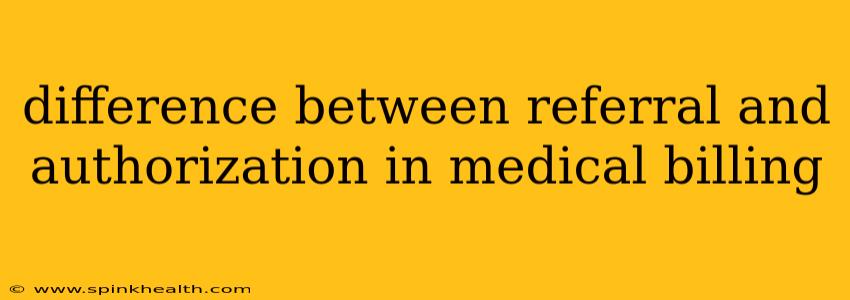Decoding the Difference: Referral vs. Authorization in Medical Billing
The world of medical billing can feel like navigating a labyrinth, especially when terms like "referral" and "authorization" seem interchangeable. But trust me, understanding the nuances between these two is crucial for both patients and medical providers to avoid costly delays and denials. Let's unravel this mystery together, turning this potentially confusing topic into a clear and concise understanding.
Imagine this: Sarah, experiencing persistent back pain, visits her primary care physician, Dr. Smith. Dr. Smith suspects a more specialized approach is needed and decides Sarah needs to see a neurologist. This is where the referral comes in.
What is a Referral?
A referral is essentially an introduction. It's a formal request from one healthcare provider (Dr. Smith, the referring physician) to another (the neurologist, the specialist) to provide care for a specific patient (Sarah). It's a recommendation, not a guarantee of payment. Think of it as a letter of introduction. It typically includes pertinent medical information to help the specialist understand Sarah's condition and history. The referral itself doesn't guarantee payment; it simply facilitates the transfer of care.
Now, let's say Sarah's insurance plan requires pre-authorization before she can see the neurologist. This is where authorization comes into play.
What is an Authorization?
Authorization, on the other hand, is a permission slip for payment. It's a formal approval from Sarah's insurance company, granting permission for the neurologist to provide specific services and receive payment for those services. This process often involves submitting detailed medical information to the insurance company for review and approval before the services are rendered. Without authorization, the insurance company might deny the claim, leaving Sarah responsible for the bill.
Here's the crucial difference: A referral is about the transfer of care, while an authorization is about the payment for care. You can have a referral without authorization, but it's unlikely you'll receive payment without authorization from the insurance company.
Do I Need Both a Referral and an Authorization?
The need for both a referral and authorization depends entirely on Sarah's specific insurance plan. Some plans require both, others may only require one or neither. Always check your insurance policy or contact your insurance provider to determine the exact requirements for your plan.
What Happens if I Don't Have the Necessary Referrals or Authorizations?
This is where things can get tricky. Without the appropriate referrals and/or authorizations, the insurance company may:
- Deny the claim: This means you'll be responsible for the full cost of the services.
- Reduce payment: The insurance company might pay a portion of the bill, leaving you to cover the remainder.
- Delay payment: The claim processing might be significantly delayed while the insurance company investigates the missing paperwork.
What if I have questions about referrals and authorizations?
- Contact your insurance provider: They are the ultimate authority on your plan's requirements.
- Check your insurance policy: The specifics of referrals and authorizations should be detailed in your policy documents.
- Ask your doctor's office: Your healthcare provider's billing department can assist with understanding the process and navigating the necessary paperwork.
By understanding the difference between a referral and authorization, you can navigate the complexities of medical billing with greater confidence, ensuring a smoother healthcare experience. Remember, clear communication with your doctor and insurance provider is key to avoiding costly surprises and ensuring timely payment for your medical care.

